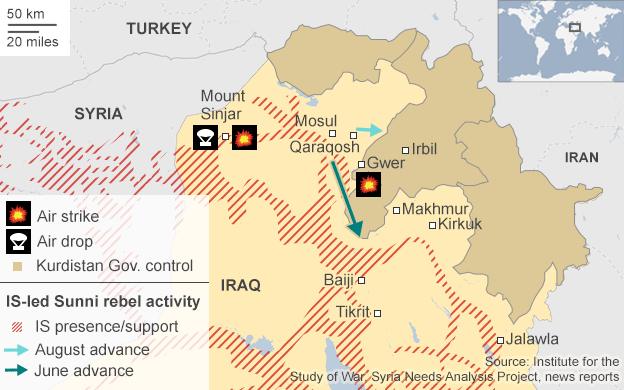Iraq president asks Abadi to succeed PM Nouri Maliki
- Published
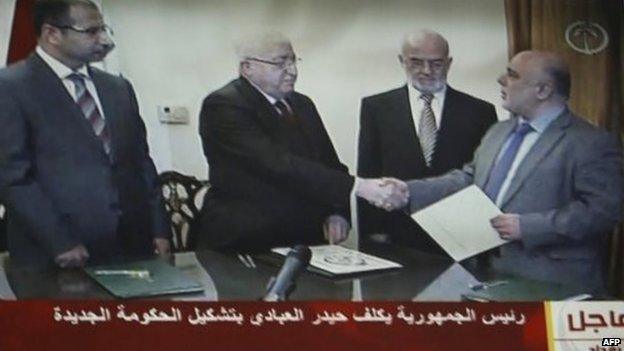
The president (2nd left) has asked Mr Abadi (right) to form a government
Iraq's president has asked the deputy speaker of parliament, Haider al-Abadi, to form a new government.
Mr Abadi had previously been nominated prime minister by Shia parties, instead of the incumbent Nouri Maliki.
But Mr Maliki said Mr Abadi's nomination was a "violation of the constitution". Mr Maliki has made it clear he wants a third term in office.
US President Barack Obama is due to give a statement on the issue at 2045 GMT.
Meanwhile the jihadist insurgency in the north of Iraq continues to cause international concern.
Fighters from the Islamic State (IS) group have made substantial gains in northern Iraq in recent months, forcing tens of thousands of people from religious minorities to flee their homes.
The US has begun supplying weapons to the Kurdish Peshmergas who are fighting the militants, senior US officials have told the Associated Press.
Iraq's security forces are also supporting the Kurdish fighters, and have already delivered three plane-loads of ammunition, a US official told the BBC.
The BBC's Caroline Wyatt speaks to refugees from Sinjar who she says are dehydrated, starving and frightened
Maliki snubbed
In Baghdad, Iraqi President Fuad Masum said in a TV address that he hoped Mr Abadi would succeed in forming a government that would "protect the Iraqi people".
"The country is now in your hands," Mr Masum told Mr Abadi, according to the French news agency AFP.
Following his nomination, Mr Abadi called on Iraqis to unite in the fight against the IS militants.
Analysts say the nomination and subsequent endorsement by the president of Mr Abadi is a public snub for Mr Maliki, whose State of Law coalition won the most seats in April's elections.
Zuhair al-Naher: "[Abadi] has the calibre and capability to pull this off"
Now he has lost support from some of his own Shias - with the Shia National Alliance reported to have given Mr Abadi 130 votes, compared with just 40 votes for Mr Maliki.
Zuhair al-Naher, from the Dawa party to which both Mr Abadi and Mr Maliki belong, told the BBC that Mr Abadi was "much more pragmatic" than Mr Maliki, and had excellent relations with all political divides.
But another Dawa party member, Khalaf Abdul-Samad, read a statement on state TV saying that Mr Abadi "only represents himself", as Mr Maliki and other supporters stood beside him.
Nouri Maliki said Iraq's new president had violated the constitution
Mr Maliki has been prime minister since 2006, but even though his coalition won the elections in April, parliament has still not agreed to give him a third term. He has also lost the backing of the US.
Mr Maliki's popularity has suffered from the growing Islamist insurgency in the north - and even before that his support from Sunnis and Kurds was dwindling.
The White House said Vice-President Joe Biden called Mr Abadi to congratulate him on his nomination - and promised US support for the formation of a new government.
"The prime minister-designate expressed his intent to move expeditiously to form a broad-based, inclusive government" capable of countering the threat of IS, a White House statement said.
Mr Abadi's nomination was also welcomed outside Iraq. The presidents of France and Turkey called for him to form a government of national unity, while the UN urged Iraqi militias to keep out of politics.

Analysis: Jim Muir, BBC Middle East correspondent
Although he has fought long and hard to hold on to his job as prime minister, it is hard to see how Nouri Maliki can continue to cling on.
For the past four years, Mr Maliki has held the defence, interior and intelligence portfolios, building up a powerful network of personal patronage among the security forces, estimated at more than a million strong, as well as setting up elite units directly responsive to him alone.
The question now is whether he will try to use the army and police forces to keep himself in power through an in situ coup, despite his lack of political support virtually across the board.
His State of Law coalition came out ahead in the April elections, but far short of an outright majority.
Having broadly alienated the Kurds and Sunnis, he now finds that even the Shia majority has concluded that he is not the man to weld the country together against the radical Islamist threat.

Who is Haider al-Abadi?
Born in Baghdad in 1952
Electrical engineer by training, PhD University of Manchester (UK)
Exiled in London during Saddam Hussein era, but still active in Iraq's Islamic Dawa Party
Returned to Iraq after 2003, became minister of communications
Served under Nouri Maliki as head of Iraqi parliament finance committee

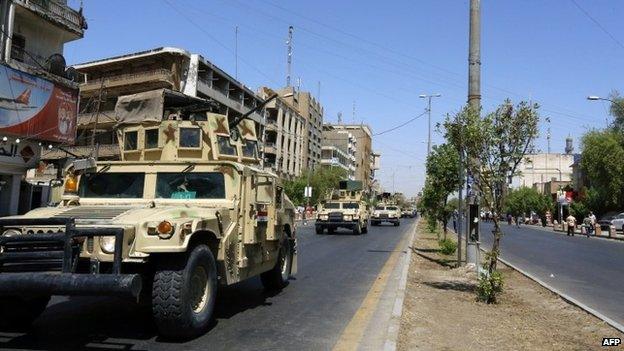
Security forces have been seen on Baghdad streets amid the political turmoil
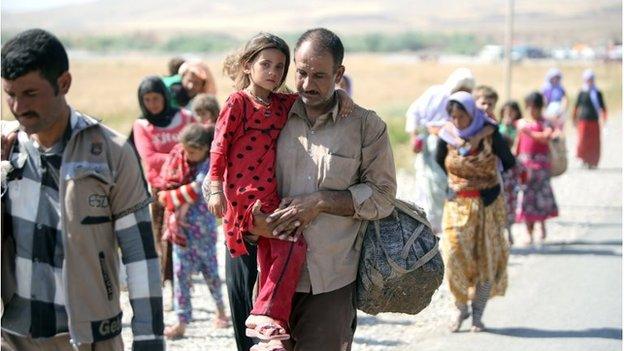
Tens of thousands of people have been displaced by the IS militants' advance in northern Iraq
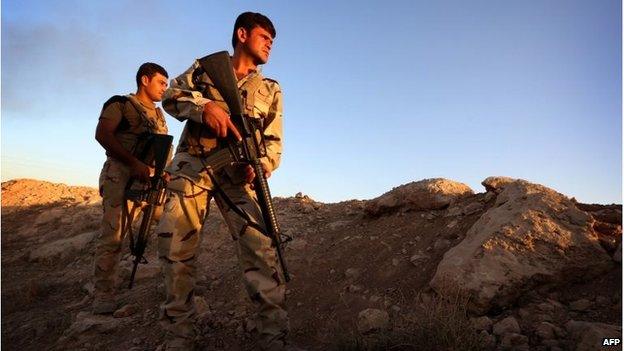
Kurdish fighters are trying to hold off the advance of IS militants
Town captured
The BBC's defence correspondent Jonathan Marcus says the arming of the Kurdish Peshmerga is a significant shift in US policy.
Until now, Washington has been reluctant to arm the Peshmerga for fear of accelerating a Kurdish break-away from Iraq, our correspondent says.
Washington has made clear that full-scale US support is contingent on new, more inclusive, governing arrangements in Baghdad.
Reports are emerging in northern Iraq that Islamic State (IS) militants have captured the town of Jalawla, north-east of Baghdad, after weeks of clashes with Kurdish fighters.
On Sunday, Kurdish forces said they had regained the towns of Gwer and Makhmur from the militants, helped by recent US air strikes in Nineveh province.
The US has already launched four rounds of air strikes targeting the militants near Irbil, the capital of Iraqi Kurdistan.
In western Iraq, minority religious groups, such as the Yazidis, have been forced from their homes, prompting international aid drops.
Witnesses told the BBC that thousands of refugees near Sinjar had escaped to safer areas.
The US air strikes have been the first direct American involvement in a military operation in Iraq since the US withdrawal from the country in late 2011.
US President Barack Obama authorised the strikes last week after members of the Yazidi sect were forced to flee Sinjar into the surrounding mountains.
